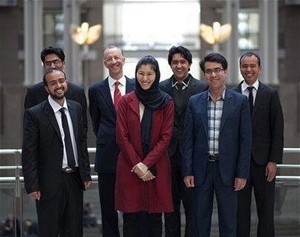
From Herat to the heart of the American justice system: The team visits the Supreme Court
USAID's RLS- F
When five law students from Herat represented Afghanistan at one of the world’s most prestigious competitions, they came away both inspired and impressed
3 SEPTEMBER 2013
When Fereshta Abbasi represented Afghanistan at one of the world’s largest, most prestigious, law school moot court competitions, she was inspired by the other female law students she met. “As a woman studying law. I thought ‘if they can do it, so can I’,” she said.
Farhad Ahmad, another member of the Afghan team, returned from the competition deeply impressed by the respect for diversity he observed in the US. “I had heard a lot of things about the US. Then I went there and saw that some things weren’t true; like that we could not find books about Islamic Law. [In fact] I was impressed with the collection [at Columbia University].”
Fereshta and Farhad were part of the five-member team from Herat University that competed at the Philip C. Jessup International Law Moot Court Competition in Washington, D.C. The Jessup Competition involves a hypothetical dispute between countries before the International Court of Justice, the judicial organ of the United Nations. This year, the case addressed the impact of climate change on statehood, migration, and sovereign lending. The participants spend months to prepare oral and written pleadings for both the applicant and respondent positions of the case. Judges assess participants based upon knowledge of international law; knowledge of the facts; style, poise and demeanor; answers to questions; and time management. USAID has sponsored Afghan students’ participation for three years, as part of the Formal Justice Sector Component of its Rule of Law Stabilization program. This year, the Afghan team competed against more than 2,000 students from 600 schools in 80 countries.
The experience was an eye-opener for the Afghans in more ways than one. They visited the US Supreme Court, their country’s embassy in Washington, D.C., Columbia University in New York and the Afghan Mission at the United Nations.
Fereshta said she came away with a greater sense of being a global citizen. “[Till I went to the United Nations] I always thought Afghanistan was far from the international community, but I saw that we are not.”







Comment
Make a general inquiry or suggest an improvement.